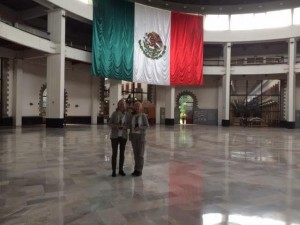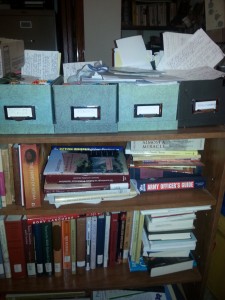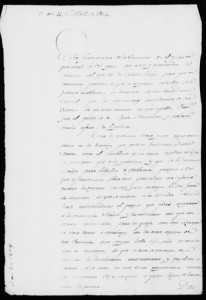Why do people steal documents in order to add them to their private collections?
 Several years ago, I was doing research at the Archivo Municipal de Matamoros. The room is dungeon-like, deep in the bowels of Casa Mata, a 200 year-old fort. The chairs are hard wood, the table worn oak, polished from years of use. The walls are solid stone, probably three or four feet thick. There is no air conditioning or heating. Summers are not so bad. Winters are brutal, like sitting on the ‘frozen tundra’ of Lambeau Field. I was there in December. (I’ve mentioned Casa Mata before).
Several years ago, I was doing research at the Archivo Municipal de Matamoros. The room is dungeon-like, deep in the bowels of Casa Mata, a 200 year-old fort. The chairs are hard wood, the table worn oak, polished from years of use. The walls are solid stone, probably three or four feet thick. There is no air conditioning or heating. Summers are not so bad. Winters are brutal, like sitting on the ‘frozen tundra’ of Lambeau Field. I was there in December. (I’ve mentioned Casa Mata before).
I had just hit paydirt and the cold no longer mattered. I found an 1842 census that revealed that a woman whom everyone had thought had been a wealthy widow and rancher’s daughter, was listed as a ‘sirvienta’ or servant with two illegitimate children. I was ecstatic. Nearly yipping with excitement, I turned to share the info. You just never know what you’ll find and I had found the mother lode.
A local Mexican lawyer happened to be in the room speaking to the archivist. He glared at me and sneered. “I hope you aren’t going to steal that document,” he said. Whoa! Wait! What? Just because I look Anglo? No, because it is true that Mexican archives are raided for material all the time and precious documents are sold to rich American ‘investor/collectors.’
As far as I was concerned, if that document didn’t remain right where it was, carefully archived and protected and accessible to other scholars, I would never be able to prove my case about the young woman. For historians, like scientists, our bread and butter comes from being able to provide solid, physical proof of what we are describing.
 I had already had the bitter experience of not finding elusive documents. Back in the 1930s, Herbert E. Bolton, the great scholar and teacher, and his students had written an index of the materials available in the Archivo General de la Nación, the 500 year-old Mexican archives. He maintained that there were seven carpetas or notebooks that laid out, in verbatim detail, the trial of Stephen F. Austin during his 1834-35 stay in Mexico City for treason—an incredibly important set of documents.
I had already had the bitter experience of not finding elusive documents. Back in the 1930s, Herbert E. Bolton, the great scholar and teacher, and his students had written an index of the materials available in the Archivo General de la Nación, the 500 year-old Mexican archives. He maintained that there were seven carpetas or notebooks that laid out, in verbatim detail, the trial of Stephen F. Austin during his 1834-35 stay in Mexico City for treason—an incredibly important set of documents.
I went looking for them. The vast, echoing space of the Palacio Negro de Lecumberri, where the archives are housed, has millions of documents. The section of Guerra y Marina, the military records where Bolton said they were, had not yet been indexed or even put in chronological order, in spite of Bolton’s work.
 I began asking for one Hollinger box after another. Slowly, methodically, interminably. Not being a particularly patient person, I finally got fed up. I pitched a fit, yelling and screaming, and perhaps there was a bit of cursing. I was so horribly noisy that a Texas friend who heard me came hurrying from another hall to see if he really recognized that voice. He did.
I began asking for one Hollinger box after another. Slowly, methodically, interminably. Not being a particularly patient person, I finally got fed up. I pitched a fit, yelling and screaming, and perhaps there was a bit of cursing. I was so horribly noisy that a Texas friend who heard me came hurrying from another hall to see if he really recognized that voice. He did.
I spent the next six weeks, eight hours a day, up in the cells going through 1,400 plus boxes. Hands black with hundred-year-old dirt, back aching (there were no tables or chairs up in the cells), and eyes bleary from trying to read ornate notaries’ script, I am here to swear that those seven carpetas are not in the Mexican archives.
 Without any doubt, they were stolen and sold to some Texas oilman. I thought, for a while, that they might be in the immense collection of Austin descendant, J. P. Bryan. His amazing gathering of Texana is now on display at his Bryan museum in Galveston. The carpetas aren’t there. I checked—when I helped organize his Spanish documents collection. He’s legit.
Without any doubt, they were stolen and sold to some Texas oilman. I thought, for a while, that they might be in the immense collection of Austin descendant, J. P. Bryan. His amazing gathering of Texana is now on display at his Bryan museum in Galveston. The carpetas aren’t there. I checked—when I helped organize his Spanish documents collection. He’s legit.
Often researchers, and especially genealogists, complain about the rigid rules at most archives. Lock all your personal items in a locker; take in only a pencil; no notebooks, paper or cards. It is restrictive, but it is absolutely necessary. At the Briscoe Center for Texas History, I watched one man surreptitiously fold up a historic document and stuff it into the back of his pants!
It’s a shame, but people do steal documents and make a profit by selling them to the highest bidder. And there are always buyers out there.



… [Trackback]
[…] Find More on to that Topic: carolinacastillocrimm.com/researching-and-stolen-documents/ […]
… [Trackback]
[…] Info to that Topic: carolinacastillocrimm.com/researching-and-stolen-documents/ […]
… [Trackback]
[…] There you will find 67478 additional Information on that Topic: carolinacastillocrimm.com/researching-and-stolen-documents/ […]
… [Trackback]
[…] Info to that Topic: carolinacastillocrimm.com/researching-and-stolen-documents/ […]
… [Trackback]
[…] Find More here to that Topic: carolinacastillocrimm.com/researching-and-stolen-documents/ […]
… [Trackback]
[…] Read More on to that Topic: carolinacastillocrimm.com/researching-and-stolen-documents/ […]
… [Trackback]
[…] Find More Info here to that Topic: carolinacastillocrimm.com/researching-and-stolen-documents/ […]
… [Trackback]
[…] Read More on to that Topic: carolinacastillocrimm.com/researching-and-stolen-documents/ […]
… [Trackback]
[…] Find More on on that Topic: carolinacastillocrimm.com/researching-and-stolen-documents/ […]
… [Trackback]
[…] Find More on that Topic: carolinacastillocrimm.com/researching-and-stolen-documents/ […]
… [Trackback]
[…] Read More Info here on that Topic: carolinacastillocrimm.com/researching-and-stolen-documents/ […]
… [Trackback]
[…] Here you will find 57601 additional Information on that Topic: carolinacastillocrimm.com/researching-and-stolen-documents/ […]
… [Trackback]
[…] There you will find 67885 more Info to that Topic: carolinacastillocrimm.com/researching-and-stolen-documents/ […]
… [Trackback]
[…] Read More Information here on that Topic: carolinacastillocrimm.com/researching-and-stolen-documents/ […]
… [Trackback]
[…] Read More to that Topic: carolinacastillocrimm.com/researching-and-stolen-documents/ […]
… [Trackback]
[…] Info to that Topic: carolinacastillocrimm.com/researching-and-stolen-documents/ […]
… [Trackback]
[…] Find More Information here on that Topic: carolinacastillocrimm.com/researching-and-stolen-documents/ […]
… [Trackback]
[…] Read More here on that Topic: carolinacastillocrimm.com/researching-and-stolen-documents/ […]